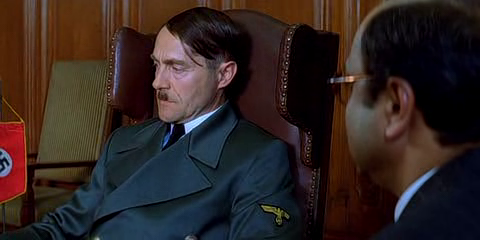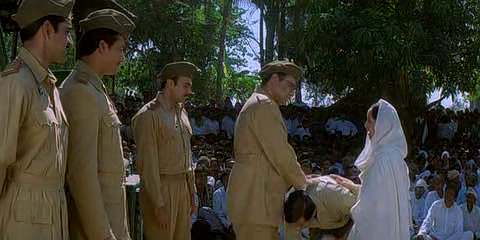|
by Sucheto Nath When I saw it, my first reaction was to remember an emojipasta, probably found exclusively in a Facebook group about Love Live!, which begins thus: Bose: The Forgotten Hero, a three-and-a-half-hour film, follows Netaji Subhas Chandra Bose from his separation from the Indian National Congress to the moment his plane leaves Saigon in 1945 - the very plane which reportedly crashed, killing the leader of the Azad Hind Fauj. The film is quite surprising, I might add; the plot is quite engaging and evenly poised, and even the special effects are nothing to snort at. However, there is the slight problem that the hero joined forces with this man here: Another, perhaps equally difficult matter, but less discussed in school history classes, is the question of an Indian attacking the Indian state with an army. This is easily explained by saying that the country was under British rule; the film clearly shows Bose promising that democratic elections will be held after his military victory. But one wonders how such matters will be presented in a commercial film made to please viewers or inspire patriotism. The film is divided into three parts, taking their names from Netaji’s speech in the third part - Faith, Unity, and Sacrifice. In Sacrifice, having been forced to retreat, Netaji is addressing a gathering at Sadhugon Village in Burma, promising the villagers that with their help, Delhi won’t be far. When he finishes, a woman in a white saree gets up and makes her way through the crowd with a young man behind her. She and her son walk up to Netaji; he holds his hand out, silently, holding what appears to be lentils, as his mother says that it is all she can give. She asks for blessings for a long life for her ‘child’, a man who looks to be in his twenties or thirties (throughout the film, we see such characters who look older than they are). Netaji frankly tells her, ‘I can’t accept this, mother,’ because it’s too little. The poor woman says that she will sell everything she has if she must, and Bose asks her to give him her dearest possession - her son, who is still holding out his hand, frowning and mute. The woman says that her son Laxman is all she has, and there is no one to look after her; Netaji asks if he is not her son, and that even Rama (in the Ramayana) could not win without Laxman. The mother smiles through her tears, and agrees, and she exchanges a look with her speechless son, who makes an obeisance to Netaji. The mother, with wet eyes, says that they are lucky to find a ‘brother’ for Laxman like him, and Netaji then returns the gesture of respect to the mother, and embraces her, calling her ‘the mother of the entire nation’. The crowd erupts in applause and cheers, while the son stands by, still silent. It’s at this point that I find myself thinking: Upto this point in the story, and it is just past three hours, I was willing to believe that this was an uncritical look at one of India’s most honoured martyrs. Every decision made by the hero is shown as a willingness to sacrifice everything for the greater good. It is only at this moment that I found myself questioning the film’s motive. It was like a ‘glitch in the matrix’, jolting me out of my somewhat passive acceptance of the film’s message. Criticism aimed at Netaji isn’t restricted to his decision to join the Axis. In any dispute over national independence, both sides tend to have at least some claim to legitimacy. Some historians - not all of them British, by any means - are of the opinion that the Azad Hind Fauj did more harm than good. A film about Netaji will almost certainly look at the best aspects of the Fauj, or (hypothetically) even interpret facts in the protagonist’s favour. This scene with the silent man makes us wonder whether this film had a different motive. What if it’s all ironic? What I’m saying is about the film itself, of course, and not history. In the film, Netaji leaves the Congress and Gandhi, but remains emotionally tied to him. His efforts to escape India are at once remarkable for his tenacity in trying circumstances, and their absurdly burlesque, comic nature, such as when his watch is taken by a corrupt policeman in Kabul. The family with whom Netaji stays in Kabul begin to weep when he leaves, and the viewer cannot help but think that their devotion seems a little too sincere. The inclusion of Hitler himself, who delivers Hitler-like speeches in English, and hands Netaji a model of a submarine, telling him to ‘take it’, has a comic flavour. Over half of the film was over before the promises of armed attack were fulfilled. Even then, the troubles of the army are at once tragic, and something else. Netaji’s troops are ill-supplied and neglected, often being expected to fight with or wait for the Japanese, despite Netaji’s wish for independent action. In the end, the army is called back because the Japanese wish to surrender after the nuclear bombs are dropped. There is a mutiny due to racism in the army; one soldier waves a white flag at Allied planes; another is a foolish drunkard who begs Netaji to take him back after being ordered to leave. One particularly strange fact is that Netaji insists on having a brigade for female soldiers, despite local reservations, but he is very eager to keep them out of harm’s way in the film - the only time we see the women gathered is when Netaji is ordering them to retreat to safety. And, of course, in the end, the leader himself was lost. Keeping these things in mind, we cannot help but ask, ‘What would I do to make a very ironic film about a national hero?’ First, I’d make it look very serious, almost too much. The protagonist would continuously justify his actions as ‘for the greater good’. Despite his failures, he would continue to move forward and encourage his comrades. There would be a scene of a supreme act of sacrifice for the leader, with rousing music and a show of support, and some kind of appeal to national spirit, perhaps in terms of motherhood. Enter the silent man. Without speaking a word, like one of the soldiers in English war poetry, the ‘child’ asks for Netaji’s blessings when his mother, in her love for a military leader, gives him her only son. The boy is never seen again, and the campaign itself, despite all efforts, comes to naught. The ‘mother of the nation’ may well have lost her child. All this being said, of course, the film certainly stays close enough to history to be ambiguous at best. In terms of pragmatics, it is extremely unlikely that a commercial film about a national hero would be critical, let alone ironic. Richard Attenborough’s Gandhi, one recalls, was careful to avoid criticism, despite not really being an Indian film itself. But at the end, one cannot help but wonder - what if?
Follow us on Facebook and Instagram to be notified whenever we release new articles.
Do you use an RSS reader? Even better!
0 Comments
Leave a Reply. |
Categories
All
Archives
December 2022
|





 RSS Feed
RSS Feed
